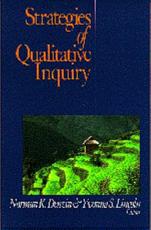Denzin, N.K. and Lincoln, Y.S. (eds) (1998). Strategies of Qualitative Inquiry, Thousand Oaks/London/New Delhi: SAGE Publications, Inc
Chapter 8: Biographical Method (pp. 184-224)
[Louis m. Smith]
- A perspective on Biography: Domain, variety and complexity
“In an unusual sense, I would argue, every text that is created is a self-statement, a bit of autobiography, a statement that carries an individual signature” (p. 184)
“Such reasoning suggests that all writting should be in the first person, reflecting that individual voice, even when one writes a chapter in a handbook” (pp. 184-185)
“I spent a long semester in an elementary classroom taught by a man named William Geoffrey. We wrote a book about that experience, ‘The Complexities of an Urban Classroom’ (Smith & Geoffrey, 1968). It was cast as a “microethnography” of a classroom, a study of a small social system. In another sense the book was a piece of a biography, the story of one semester of Geoffrey and his teaching. In a further sense, it became part of my autobiography, the most important professional learning experience of my life, an “epiphany” or “turning point” in Denzin’s (1989) interpretive theory of biography.” (p. 186)
“(…) but the major point here is that biography, “life writing”, comes in multiple forms, lengths, focuses, and perspectives” (p. 187)
“For anyone with “scientific” leanings, doing “fiction” is anathema. ‘Caveat emptor’ is an immediate response” (p. 188)
“The biographer’s agony is caught with might be called “the restless theme” (Smith, 1992). In the biography of Nora Barlow, the “intellectual aristocracy” became a major competing theme. I agonized over that during much of my spring 1990 Sabbatical in Cambridge. Which theme is superordinate and which is subordinate? Which will carry better the burden of the evidence of the life? And for which audience? The biographer’s internal argument over which theme is the more powerful eventually is entangled in the question of “audience” and publisher. To whom does one want to speak, and who wants to produce the book?” (p. 195)
“Each biographer carries his or her own conception of personality, or character, as it is called by literary biographers” (p. 196)
“From my perspective, and in a not so simple manner, the biographer brings all f his or her own personality, understandings, and experience to the task of creating a view of the individual under study. If that is true, it poses severe problems for traditional social science, for the sources and implementation of creativity can only be bolstered by technocratic procedures, not carried by them. That raises a long and tortuous argument for those of us working in that tradition.” (p. 196)
“One of the biographer’s major decisions lies in the form or type of biography to be attempted” (p. 197)
“’Narrative biography’ involves a fictionalizing of scenes and conversations, based on letters and documents, that make the writing both factual and highly imaginative at the same time”. (p. 197)
“The intellectual problems seem to demand more of creativity than of technical or rule-governed problem solving. And that is a challenge to the practice of traditional social science. Some of my students and colleagues suggest that the integration might occur in ‘metacognition’, self-directed thinking about thinking”. (p. 199)
“The roots of political actions lie in the motives, personalities, and characters of key individual actors in any set of important historical events.” (p. 203)
“The study of group biography gives insight into the larger problems of social structure and social mobility. Networks, overlapping boards, connections, and family relationships are built on individual people interacting together for their own interests. Mapping those careers and linkages is an important means of understanding”. (p. 203)
“Biography becomes not an end in itself, but a helpful element in the pursuit of other ends.” ( p. 203)
“Although variation exists among social scientists, most argue that biography should move beyond narration and storytelling of the particular into more abstract conceptualizations, interpretations, and explanations”. (p. 204)
“The sequence of events as an individual passes through a culture during the course of a life is one view of that culture. And the resulting kind of person and his or her outlook on life are related additional ways of viewing a culture”. (p. 204)
“Cultures can be written through lives”. (p. 204)
“With his usual persuasive style, he (Geertz) makes the point that the reader’s acceptance of the text occurs not because of its factual weight or the theoretical places being created, but rather because of its narrative strength, based on rhetorical devices, convincing the reader that he, the anthropologist, was really there”. (p. 205)
“Anyone who has ever felt left out, ignored, or powerless has the beginnings of an understanding of the feminist and minority perspectives that have arisen in recent decades with great vigor and anger in the field of biography and autobiography”. (p. 210)
“Examining issues in equity, power, social structure, agency, self-definition, and their interralations, so it is argued by feminists, will be enhanced by the writing of all kinds of personal narratives of all kinds of lives of all kinds of women. Images, models, and insights for change exist in the life-writing narratives and critical reflections upon those stories”. (p. 210)
“Life stories can be a powerful influence on creativity, and that is no mean accomplishment”. (p. 214)
“Much of recent life writing in professional education carries the same intellectual flavor of the feminist and minority perspective, finding voice among the desinfranchised, the powerless, or those with alternative visions”. (p. 215)
